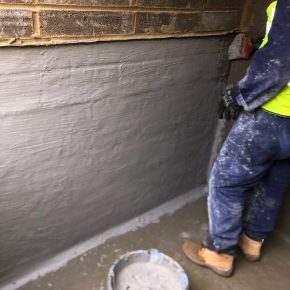
Reducing risk at the pre-contract stage of a construction project
When looking at risk managing a construction project, one of the critical time periods that is often overlooked is pre-contract risk: assessing the company you’ll be working for and with before you invest any time or resources in the project.
One of the greatest threats to a project and one of the biggest causes for potential disputes is a failure to properly understand the requirements of the contract and properly address pre-contract risk.
There are so many variables and risks associated with being part of a large scale project, possibly with third party vendors involved, regarding the project, the companies involved, the financing and financial institutions involved.
The Kenzie Group has put together a brief guide to help you to reduce pre-contract risk in your project. The guide prompts thought into some of the questions you should be asking yourself, and the factors you need to be considering before tendering on a project or finalizing the project.
Pre-contract risk management
Risk management can start when you have an opportunity to tender for a project. At this stage, you need to make the decision whether it’s worth your time to even prepare and submit your tender.
The key criteria to be considered when deciding on whether you should submit your tender start with identifying the risk. Once you’ve identified the potential risk you’ll need to go through the process of evaluating it. Now, you’re able to mitigate the risk by deciding if you are going to decline the tender, accept the risk but cost accordingly or identify a way to reduce or transfer the risk.
For example, before tendering for that great new project ask yourself these questions:
- Is the employer financially secure? Do some research on the finances of the employer to determine if it’s worth your time tendering.
- How is the project being funded, and is the funding really secure? Analyze the realities and cost of funding.
- Does the employer have a reputation for paying on time? Get to know your future bedfellow, you may need to factor in late payments into your tender.
- Has the employed signed the Fair Payment Charter? It’s a quick check but worth knowing if you might be working for.
When looking at risk managing this stage of the process, you need to bear in mind that it’s something that needs to be revisited on a regular basis.
Initially, at the expression of interest stage, then again during the tender application stage. You need to revisit your analysis again at contract issue before making the decision to accept the contact.
Following the recent administration of a number of major contractors, in the current industry climate, it is essential that you are confident that your employer, either the main contractor or the client, is able to pay for the works you have planned to carry out. Although this may seem like common sense, it is paramount and should not be ignored.
During the tender and pre-contract stage, when reviewing the contract, it is important to consider issues that may cause risks to both the time and cost of the project:
- Is the program realistic for the works which have been defined? Are there contractually binding target or interim dates?
- Are the completion dates clear and unconditional?
- Do all program revisions need to be approved?
- Can you claim extensions of time for events outside of your control which delay the works?
- Can you claim loss of productivity for events outside your control which disrupt the works?
- Are liquidated damages (LADs) set at a reasonable level?
- If the project takes a long time, does the contract permit price fluctuations for rising costs in materials or energy?
- Can the employer ask you to complete works sooner than the originally agreed completion date?
- Is the retention per cent acceptable?
- What is the period between certification of instalments and the final date for payment?
- If you are subcontracting works out, does this meet your subcontractor’s expectations regarding payment periods?
- Is the procedure for changing the price due to instructions or risk events robust and workable?
- Is the percentage of the price represented by provisional sums acceptable?
- Can the employer omit works and, if so, how would this affect your profit margin?
In summary
Larger scale construction projects are complicated beasts with a lot of moving parts, and a lot of parties involved. A company involved in construction is going to have to prepare to be exposed to an increasing amount of risk and that means to have stringent risk management processes in place, starting with risk management at the pre-contract stage.
PWC recently discovered that out of the companies surveyed, 71% firmly held the belief that they have robust security activities, however, of that 71% just 32% actually required their third parties to comply with those policies.
Conducting some due diligence at the pre-contract stage allows you to paint are a more accurate picture of the risks associated with the project and how those risks may or may not be mitigated. At the same time, you should research the companies associated with the project, assess their risk as potential partners
Due to the time periods connected with such projects, circumstances and risk can change and needs to be revisited at several key points during the project, including some critical stages during the pre-contract stage.
The questions answered above should be answered in as much detail as feasible. Some elementary checks should be conducted at the tender invitation stage with a more complete risk analysis completed during the tender application process as naturally, you look at the project under a microscope.
If you are unsure of the answers to any of the above questions, then it is advisable to discuss with a construction contract claim consultant, and the Kenzie Group can help ensure your contract is robust with a fair and appropriate balance of risk, whilst reducing the risk for you wherever possible.
Latest news

31st March 2025
Stannah Lifts urges lift owners to prepare for the PSTN switch over
Stannah Lifts, a leading provider of lift solutions, is calling on businesses and facility managers to act now and upgrade their lift communications systems to ensure they are ready for the UK’s new high-speed, GSM digital network.
Posted in Accessibility, Articles, Building Industry News, Building Products & Structures, Building Regulations & Accreditations, Building Services, Facility Management & Building Services, Health & Safety, Information Technology, Interiors, Lifts, Restoration & Refurbishment, Retrofit & Renovation
31st March 2025
Delta: Lift Pit Waterproofing - Type A solutions
Delta Membranes has recently worked on a project whereby the scope was to provide a waterproofing solution to a newly constructed lift pit for a four-storey residential block.
Posted in Articles, Building Industry News, Building Products & Structures, Building Services, Case Studies, Concrete, Cement, Admixtures, Damp & Waterproofing, Facility Management & Building Services, Restoration & Refurbishment, Retrofit & Renovation
31st March 2025
HMG Paints renew partnership with Belle Vue Aces Speedway
HMG Paints has renewed its partnership with Belle Vue Aces for the 2025 season. This year marks a particularly exciting chapter for Belle Vue Speedway, as the club and National Speedway Stadium will host an electrifying double-header of the FIM Speedway Grand Prix in 2025.
Posted in Articles, Building Industry News, Building Products & Structures, Case Studies, Interiors, Paints, Paints, Coatings & Finishes, Posts, Restoration & Refurbishment, Retrofit & Renovation
31st March 2025
Ideal Heating sponsored CIBSE BPA Engineer of the Year announced
As the sponsor of the Engineer of the Year award at the Chartered Institution of Building Services Engineers (CIBSE) Building Performance Awards, Ideal Heating Commercial was delighted to present the award to Volkan Doda, Head of Design Technologies at Atelier Ten.
Posted in Articles, Awards, Building Associations & Institutes, Building Industry Events, Building Industry News, Building Products & Structures, Building Services, Facility Management & Building Services, Heating Systems, Controls and Management, Heating, Ventilation and Air Conditioning - HVAC, Pipes, Pipes & Fittings, Plumbing, Retrofit & Renovation
 Sign up:
Sign up: